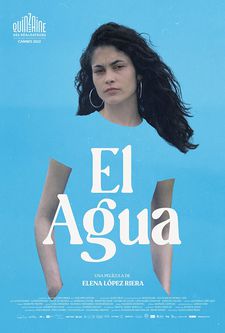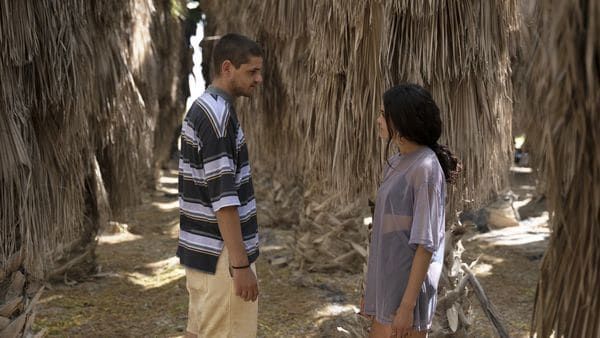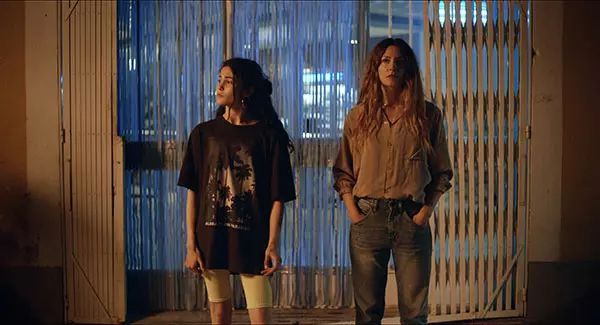Riera previously focused on documentary work and she told us about her route into filmmaking. “I never did film school. I don't know how to make films,” she says. “I just do whatever I think and I feel I work a lot with my entrails. I mean I really need to feel things because it's the only way I learn. I started making things with my little camera and with my band of friends. And I really tried to do my first feature film under the very same rules. I was a little bit particular and a lot of people from the crew didn't agree with me, but for me, it was super-necessary to have a very small crew. So when we shoot the fiction, we were like, five or six - I have a cameraman and I have the sound engineer an I have a little screen that was very close to the camera. I'm very close to the actors like in a documentary. I really shot the fiction as a documentary.”
You can feel the documentary elements of the film underpinning the fictional narrative, especially as the director uses cutaways to local women talking about the myth of a river falling in love and stealing away women when it is in spate. The film features established stars Barbara Lennie and Nieve de Medina but she also casts two newcomers in the leading roles - Luna Pamiés and Alberto Olmo - and Riera says it was important to her that her stars were local to the area.
She adds: “I wanted to work a long long time with them. I mean, I was working like this for six months before the shooting, it was a huge work. The script was nourished by my work with them.
“But I really like to confront the worlds between the professional and non-professional, for me, there's this challenge but it's also a very particular music that is played with when you when you work with such a big professional as Barbara and Nieve because they are like, obviously super-good actresses, and very well formed by their studies but they are also very generous. They accepted this challenge. And this is something that we don't do very often in Spanish cinema, but I spent the last 15 years in France, which has a very strong tradition of mixing the professional and non-professional - Renoir did it, Jean Eustache did it, Chantal Akerman did it. So for me, when it happens, and it works, it's magical.”
Riera says her process in the six months ahead of shooting involved hanging out with her two young stars a lot and getting to know them with the script not even talked about until a fortnight before the film was set to shoot.
When asked whether her film was, in some ways, interested in preserving this local myth and tradition, Riera says: “For me, there’s something worse than losing traditions - losing present life. I mean, life is hard there but life is hard everywhere. Now I’m in Madrid and the prices of the rent are augmenting. I'm sorry, but I'm not very optimistic about society. We are destroying the planet. We are in a very bad situation so I didn't want to romanticise this regard for rural life because it’s not nice and it’s not going to get better.
 |
| El Agua poster |
She says: I was, like, “It’s my first film and if I don't try things now, when? I don't want to be the good student. I don’t want to please everyone because it is impossible, first of all. Secondly, I don't want to be afraid of filmmaking. I’m sick of being afraid of things and I don't want to also be afraid of my work. I mean, I'm afraid of men, I'm afraid of the future, I'm afraid of all the things that people told me that I should be afraid of and I don't want to be afraid about the aesthetic of my film.”
She adds: “I used to, I used to be a programmer for a film festival. This is why I'm also a bit more courageous in terms. That’s why I couldn’t stand one more coming of age thing. I mean, it was like, maybe it’s not perfect but at least we’ll try something. That’s what was interesting for me.”
The mix of documentary and fiction continues to interest the director as she looks to the future.
“I really like documentaries. And the way I do fiction, I could maybe not do a pure fiction because I’m so fascinated by this documentary point of view that I think it would be completely impossible for me to get this distance from reality.
“I'm trying to write a new annual movie about phantoms, as well, because for me cinema is like 'phantomatic' and I'm interested in the fantastic. But also to do the fantastic through documentary, which seems to be completely crazy. But I really liked this way of doing things. I’m also trying to maybe do something with all the rushes that we didn't edit for the film because we shot a lot. Maybe doing something more experimental, a short film or video installation, because I'm very interested in those areas of work.”
The Water screens at San Sebastian Film Festival in the Zabaltegi-Tabakalera section. We'll be bringing you more news and reviews from the festival, which runs from September 16 to 24.























